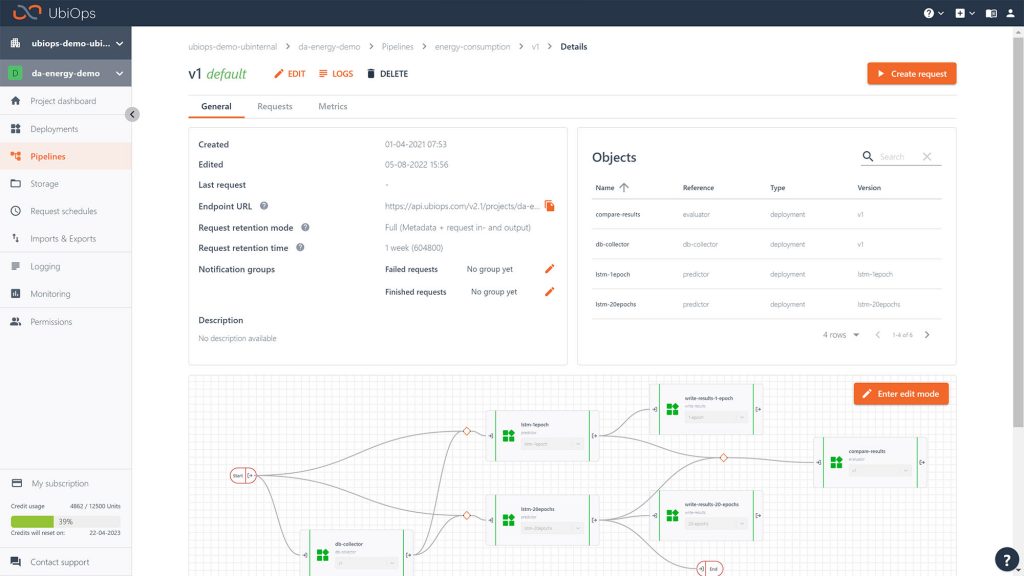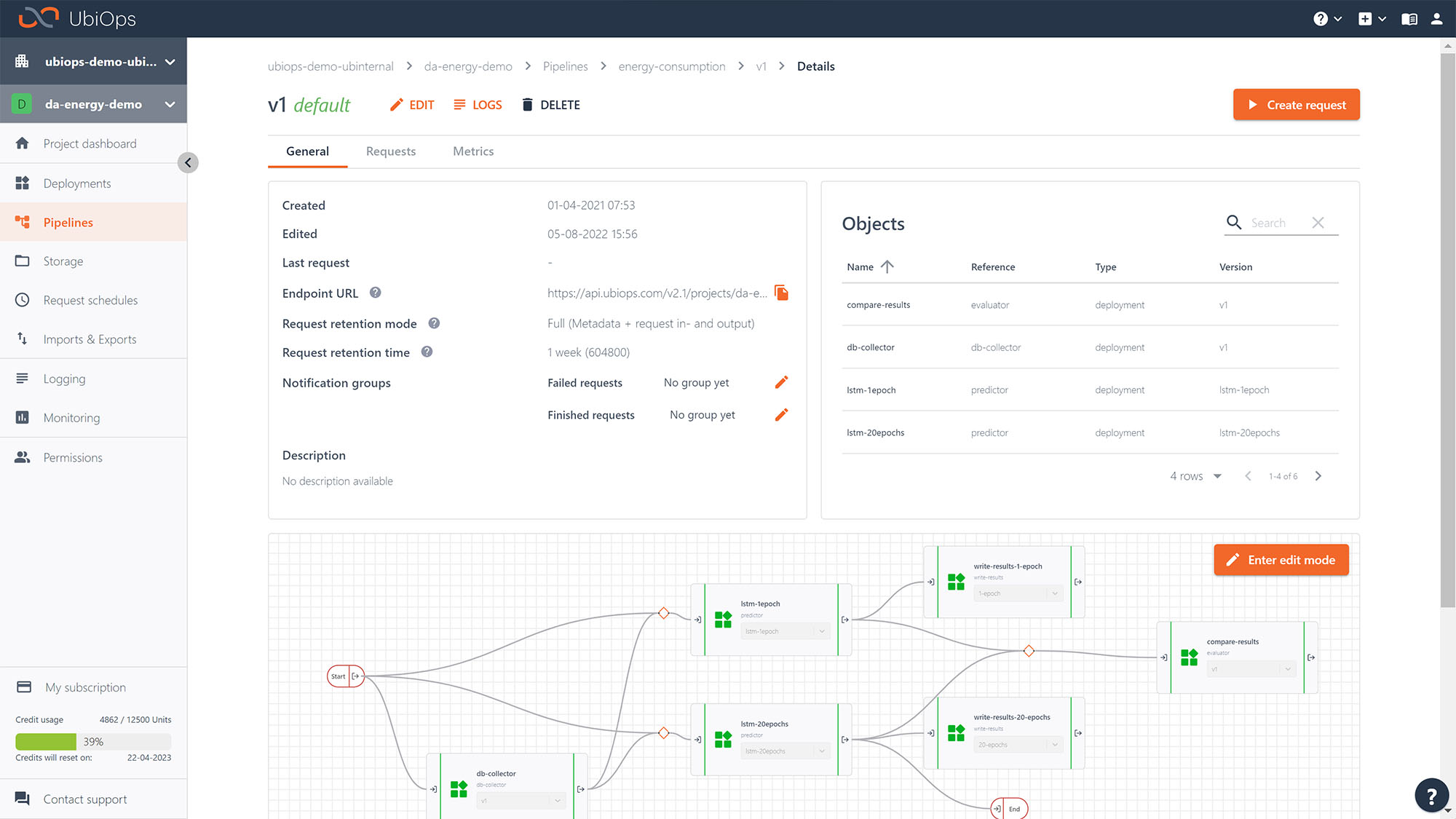UbiOps is a fast-growing software scale-up with offices in The Netherlands (The Hague & Amsterdam) and the US (Fort Worth). UbiOps develops a Software-as-a-Service AI platform with the same name.
UbiOps is a leading platform for running Artificial Intelligence (AI) at scale. Companies like Bayer, BAM and the National Cyber Security Center make use of UbiOps’ powerful and reliable platform for launching, running and managing AI applications and services.
Easy Engineering: What are the main areas of activity of the company?
UbiOps: With UbiOps data scientists can easily run AI models behind their own applications, products or inside data/IT infrastructure. Without having to worry about security, reliability or scalability.
Ubiops as an MLOps tool reduces development costs significantly, increases productivity of your data science team and decreases your time to market. Moreover, UbiOps is cloud and industry agnostic.
We help data science teams solve their technical challenges for building and running the next generation of AI products and services. The benefits of using UbiOps boil down to:
Faster Time to Market: We enable businesses to deploy machine learning models and data science workflows in a production environment quickly and efficiently, reducing the time-to-market and operating costs for new products and services.
Increased Efficiency: UbiOps simplifies the deployment and management of machine learning models and data science workflows, allowing teams to focus on their core competencies instead of managing infrastructure and deployment pipelines.
Improved Scalability: UbiOps provides a cloud-based infrastructure that can scale up or down based on the business needs, ensuring that the deployed models and workflows can handle increased volumes of data or users. UbiOps also ensures access and availability to the right hardware, https://ubiops.com/gpu-support-on-ubiops/
Enhanced Security: UbiOps has robust security features such as end-to-end encryption, secure data storage, and access controls, which can help businesses comply with data privacy regulations such as GDPR and CCPA.

E.E: What’s the news about new products?
UbiOps: UbiOps was released in 2019 and has been evolving and improving ever since. Recently we released new functionality for building machine learning workflows and pipelines. Currently we are working on functionality for training machine learning models, which will be very useful for teams who need to (re-)train ML models in a production environment.
We also recently extended our hybrid cloud proposition, which helps teams run AI & ML models in environments and regions of choice, optimizing for compliance and costs. By partnering with cloud providers, we aim to solve the challenge of compute availability, especially for access to GPU hardware which is often used for accelerating the runtime of AI models.
E.E: What are the ranges of products?
UbiOps: The UbiOps platform is the only product UbiOps develops. It can be used as Software-as-a-Service (SaaS) or installed in your own (cloud) environment which makes it applicable in a wide range of industries.
Overall, UbiOps aims to provide a comprehensive platform for deploying and managing machine learning models and data science workflows, with a focus on scalability, reliability, and security. If you dive a bit deeper into the service itself, UbiOps’ main technical features are:
Machine Learning Deployment: UbiOps allows businesses to deploy their machine learning models and algorithms in a production environment, where they can be integrated with existing applications and processes.
Data Science Workflows: UbiOps also enables data scientists to create, test, and deploy complex data science workflows without needing to build and manage their own infrastructure.
Cloud Infrastructure: The platform provides a scalable cloud infrastructure with high availability, auto-scaling, and a variety of integration options with popular cloud providers such as AWS, Azure, and GCP.
Model Management: UbiOps offers tools for version control, monitoring, and debugging of deployed models, as well as automatic rollbacks in case of errors.
Security and Compliance: UbiOps provides robust security features such as end-to-end encryption, secure data storage, and access controls, which can help businesses comply with data privacy regulations such as GDPR and CCPA.

E.E: At what stage is the market where you are currently active?
UbiOps: We’re active in the field of MLOps (Machine Learning Operations). This exciting space is quite new and constantly evolving as more companies reach the point where they want to start implementing AI and Machine Learning into products and services.
Therefore, as more organizations adopt machine learning, there is a growing need for standardization of MLOps practices. Currently you can see a very large influx of different tools to solve challenges for different parts of the development and production lifecycle of AI & ML products.
Most businesses still need to get started with MLOps and are currently exploring options. So it will take some time before the majority of companies catch up with the market developments and best practices and standards start to emerge.
E.E: What can you tell us about market trends?
UbiOps: Security and compliance of ML solutions is an important topic for businesses. As machine learning models are increasingly used in regulated industries such as healthcare and finance, ensuring governance and compliance with data privacy regulations such as GDPR is becoming more important.
With the growing adoption of hybrid cloud environments, MLOps is also evolving to support the deployment and management of machine learning models across multiple cloud environments and on-premises infrastructure. This will help businesses with ensuring compliance and security, as well as cut costs and run models in the most efficient way. More and more companies also want their cloud compute to be sustainable and for their products to have a low carbon footprint. This means companies will look for ML solutions where they can run more inferences with fewer resources on carbon neutral data centers.
Furthermore, there is a growing need for machine learning models to be explainable and interpretable, especially in applications such as healthcare and finance where the consequences of model errors can be huge.

E.E: What are the most innovative products marketed?
UbiOps: The MLOps market is quite nascent, but there are some great developments around. Most of the innovation in the past years focused on augmenting the ‘data science workbench’ and ways of streamlining experimentation.
Recently you can see innovation on the level of available open source foundational ML models, but also in tools built for running and scaling finalized ML models for being used in products and services.
Also, on the data level you can see many things evolving. First with respect to version control in data, but also on data distribution and managing huge data sets for training models for complex machine learning tasks in computer vision and NLP.
E.E: What estimations do you have for 2023?
UbiOps: There is definitely a hype around large language models (LLMs) like ChatGPT (GPT-3) which is driving further adoption of AI in companies. You will see that companies also want to develop more niche applications of those models to use for their own business cases.
This results in a trend in open source ‘foundation models’. These are pre-trained models that have been developed on a large amount of data and are used as the basis for building more complex models for specific tasks. The current trend is that it will become easier to use these foundation models and re-train them for a specific use case with a smaller dataset, for solving a specific business problem for example.
Also, for the upcoming time, access to the right hardware in the cloud remains a challenge. Especially larger ML models require GPUs or TPUs for inference, and with all the supply chain issues, there is no wide availability of those systems anymore. A hybrid cloud approach could help by sourcing access to this hardware at different cloud providers, creating a meta cloud for compute.
About UbiOps
UbiOps is an easy-to-use deployment and serving layer for your data science code. It turns your Python & R models and scripts into web services, allowing you to use them from anywhere at any time. So you can embed them in your own applications, website or data infrastructure. Without having to worry about security, reliability or scalability. UbiOps takes care of this for you.
You can find more technical information in our documentation -> www.ubiops.com/docs
To help you getting up to speed with UbiOps, we have prepared some examples and quickstart tutorials -> www.ubiops.com/tutorials and on our YOUTUBE channel: https://www.youtube.com/@ubiops3655

